
The meaning of intellectual dishonesty and how to curb it
Discourse and debate are more effective in both democracy and business when we learn to be honest with ourselves and curb the subtle behaviors that get in the way of trading real ideas.
Table of Contents:
Disagreement doesn’t have to be so awful.
Our different viewpoints can make our families and communities and companies better. In my book Dream Teams, I argue that the best kind of collaboration requires:
A) People who think differently (aka “cognitive diversity”)
B) to put their heads together (creating “cognitive friction”),
C) and be willing to change (using “intellectual humility”).
This is the formula that explains how the most exceptional people do the impossible. Innovative companies use it to change the world. Unstoppable athletes change the game with it. Groundbreaking social movements require it. And in theory, a democracy is a great political system for making progress this way, too.
A group where everyone is equal and able to speak freely ought to be able to tap its cognitive diversity and make continuous progress on hard problems together—generating cognitive friction via:
-
Discourse (exchanging ideas); and
-
Debate (arguing the merits of those ideas).
But most of the time things don’t work out so smoothly.
Battles of different viewpoints can be painful. They often get personal. And very often, conversations about ideas devolve into battles of whose group is better than the other.
And so instead of epiphanies born from different viewpoints, we get government shut downs. Instead of civil discourse in our companies and relationships, we get backroom maneuvering—or all out war.
but it’s not because having different ideas is bad. it’s because too often discussion of our different ideas falls victim to A THING CALLED intellectual dishonesty.
The following mega-post is a thorough exploration of all the ways it’s possible to be intellectually dishonest, how to recognize it in yourself and others, and how to stop it.
Since politicians and cable news pundits employ intellectual dishonesty very visibly in debates—we’re going to explore this topic through the lens of political debate. But once you see how it works, and just how easily we can fall for it ourselves, I think you’ll be better equipped to deal with it in your own life.
Scroll down to get started, but first…

By way of disclaimer, I consider myself a political Independent. I’m going to use a lot of examples in this post of Republican and Democratic politicians and pundits. I’ll also use a lot of examples of Former President Trump because he’s a highly visible, relevant example right now. As you read, I’d ask that you take off your “political identity hat” and focus on the behaviors being discussed more than the people (and parties they belong to) who I present as examples of these behaviors.
WHAT IS INTELLECTUAL DISHONESTY?
AND WHY IT MERITS A “HARD STARE”

Intellectual Honesty is about having high standards for the truth.
It’s not just about not lying; it’s about stating the truth when you know it, hiding nothing, twisting nothing, leaving nothing out.
Intellectual dishonesty, on the other hand, is a sort of blanket term for being dishonest without necessarily straight out lying. It’s the failure to apply high standards for truth.

Intellectual dishonesty is usually self-serving. Often it’s deliberate. But it’s possible to be intellectually dishonest without realizing it, e.g. when you’re lying to yourself.
Intellectual dishonesty often hinges on technicality. It’s when you haven’t exactly, technically said a bald-faced lie… but what you’re saying isn’t really above board.
Basically, if you couldn’t look Jesus, Buddha, Muhammad, and the Virgin Mary all in the eyes when you say it, you’re probably not being completely intellectually honest.
Intellectual dishonesty is the enemy of intellectual humility. As Perry Tam puts it in Entrepreneur magazine, intellectual honesty “means always seeking the truth regardless of whether or not it agrees with your own personal beliefs.” It’s not fudging, for whatever reason.
All that said, it’s possible to be intellectually dishonest without realizing it. Especially in the case of fallacies. So it’s important to remember that just because someone’s said something intellectually dishonest, they aren’t necessarily being nefarious.
In general, I think the right thing to do is to start from a place of giving people benefit of the doubt when we spot intellectual dishonesty. But even if someone is doing it on purpose, we should strive to be as kind as possible—at least until we give them the chance to do better. (Jesus, Buddha, Muhammad, and Virgin Mary would all probably be kind to you, too, after you screwed up.)
Why is all this important? Because we can’t truly make progress through debate and discourse if we’re not all behaving with high standards of honesty.
HOW INTELLECTUAL DISHONESTY DERAILS DISCOURSE AND DEBATE
BEHAVIORS AND HABITS THAT DISTRACT, DIVIDE, OR IMPEDE PROGRESS
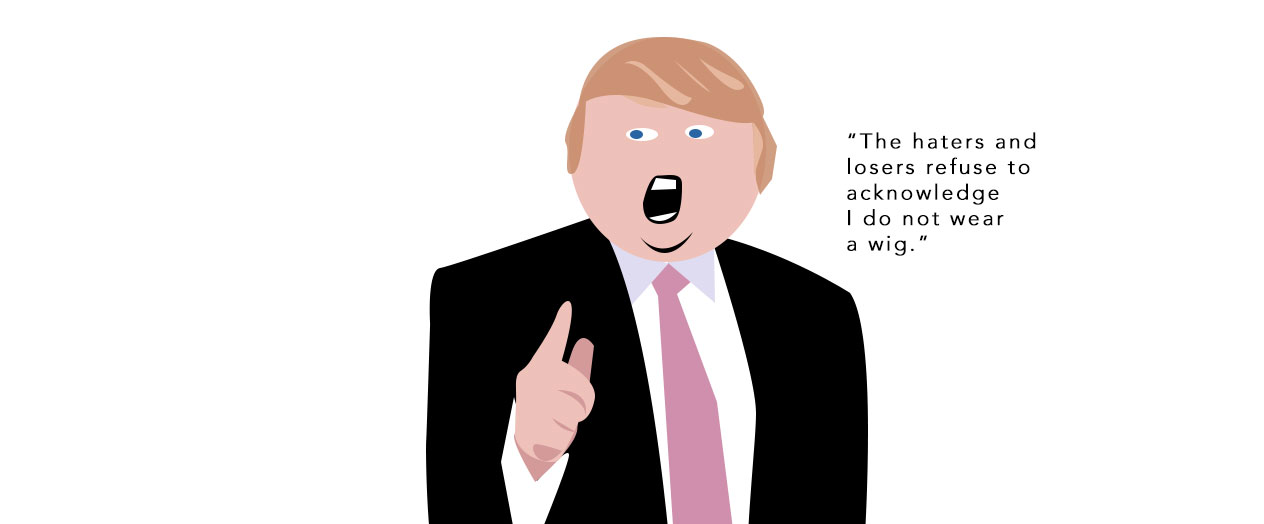
(P.S. THE HAIR IS REAL. BUT ALSO THAT IS A REAL QUOTE.)
AT THE TIME OF this writing, the 2020 primary debates are a few months away, and already Democrats are freaking out about them.
Political debates are frustrating enough without 10 people trying to get a word in. But in an era where the goal of a televised debate appearance is to look as good as possible, those overstuffed primary debates—and the one-on-one debates they’ll eventually lead to with President Donald Trump—are sure to be a shitshow from an intellectual standpoint as well.
That is, if the state of political arguments on TV and Facebook are any indicator.
Since before even the Ancient Greeks, humans have used debate as a tool for unlocking the power of our different viewpoints. A battle of ideas can allow a group to see further, but most of the time "debate" around political policy issues doesn’t work out that way.
That’s because the way we both set up and moderate political debates not only leave the door wide open for intellectual dishonesty, but actually encourage it.
There are two main reasons:
-
FIRST, rather than an exchange of ideas—which in a primary debate would be an especially good thing—debates are seen as a competition where a person “wins.” The real goal of the debaters, then, is looking as good as possible to whoever’s watching. And that means it doesn’t matter whether you answer questions honestly—or at all—as long as you appear better than the “other guy” by the time the clock runs out.
-
SECOND, most public debates put the identity of the debater and the group they represent on the line—rather than the quality of the ideas being discussed. This leads to a win-for-our-side-at-all-costs strategy. It encourages people to ignore valid arguments that go against their viewpoint. And it makes it easy to justify or ignore their own intellectual dishonesty in order to win.
This all incentivizes bad behavior and disincentivizes the exploration of new intellectual territory. Or God(s) forbid, admitting you’ve ever been wrong about anything.
Thus, most debates are rife with the four types of intellectual dishonesty. And two things make them worse: debate moderators who don’t hold people accountable, and the fact that most live debates have a clock:

Troublingly, PR training for TV—especially for political shows—often actually teaches tactics to take advantage of this. When I myself took “media training” for my first television appearances, I was taught how to deflect, distract, and pivot to whatever it was I was prepared to talk about, all while making sure that the audience doesn’t realize that’s what you’re doing.
Comedian Jon Stewart perhaps summed up the problem best in his famous TV segment on CNN’s debate show Crossfire when he said to left-wing debater Paul Begala and his right-wing co-host Tucker Carlson:
“Stop hurting America… What you do is not honest.”
Further complicating the debate debacle is the tendency for debaters, when they have come off badly in a debate, to attack the moderators of debates as biased, unfair, etc.
Sometimes this can actually be the case—especially when there aren’t clear rules to help the moderator be more like a referee. But either way, this leads to moderators holding back on policing bad behavior, for fear of looking bad themselves—and thereby losing ratings and credibility.
All this makes so many debates a waste of time, and in some ways actively divisive to society.
But it doesn’t have to be that way.
Though I’ve argued that the only good kind of debate is one where the goal is to make progress rather than win, reality is that debates between political candidates are about picking the best person for the job, which means that each debater does have a huge incentive to “win.” (I’d argue that we ought to judge political debaters by their ability to be honest and open minded, not their ability to be right about everything—since the job of a public official is not to be an expert on everything, but to use good judgment on behalf of the people they represent, in light of ever changing information.)
So for now, we’ll go through each of these 6 problems in order. We’ll start by looking at the four types of intellectual dishonesty in detail, then discuss how to curb them, and then propose some new rules that can help us set up debates in a better way.
Don't dodge the question!
INTELLECTUAL DISHONEST MOVE #1: NOT ANSWERING, WHILE PRETENDING YOU ARE
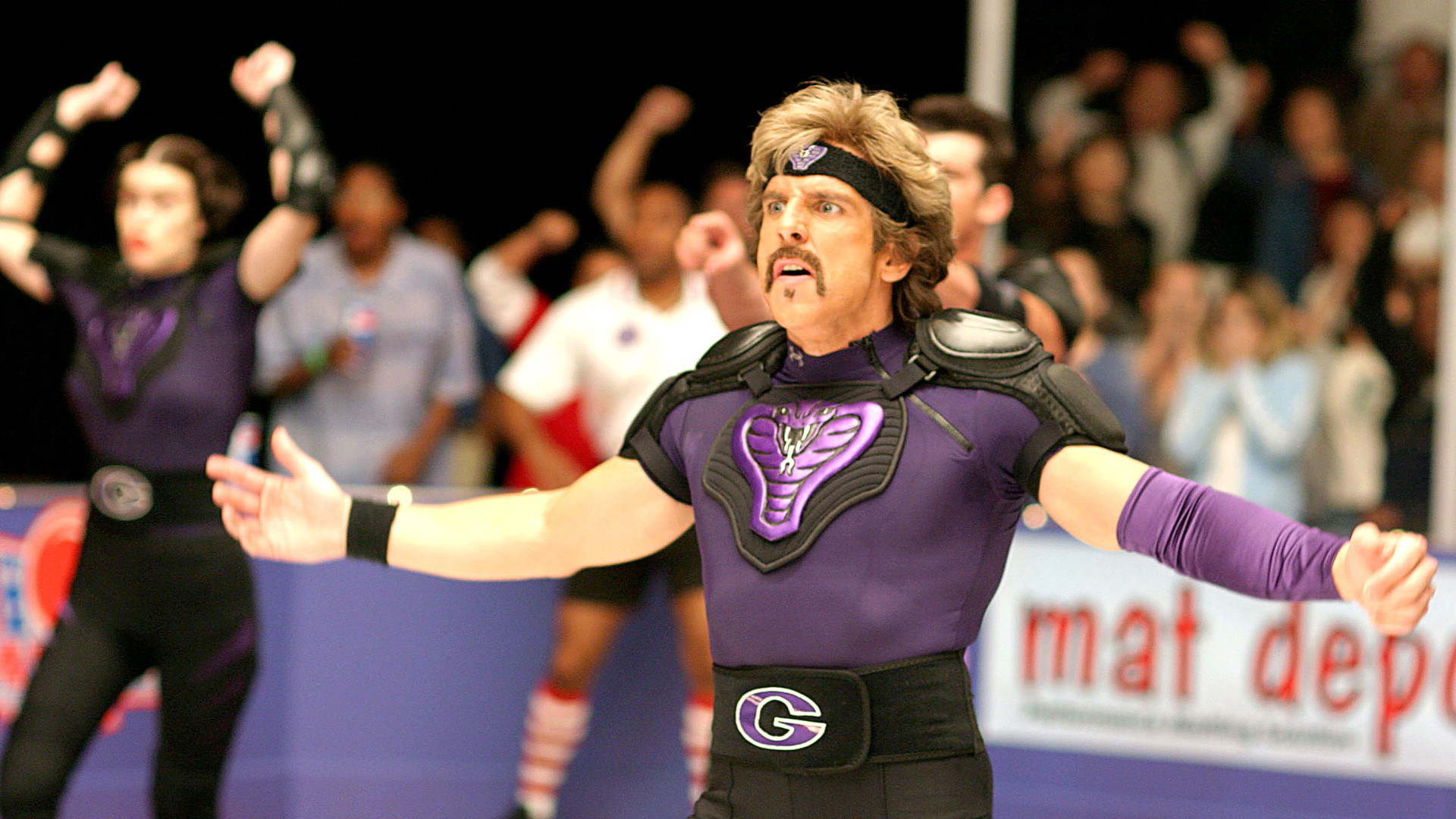
ONE OF THE MOST common ways to be intellectually dishonest in a debate is to dodge questions while pretending you’re answering them. You’re not telling a lie, but you’re being dishonest when you manipulate the discussion this way.
Like Street Fighter II characters, politicians and TV pundits have several methods for avoiding questions they don’t want to answer.
I took some liberties in naming these methods after famous political debaters who’ve used them a lot on camera.
(Note that this is not an Ad Hominem fallacy, which we’ll go over in the next section. I’m not trying to discredit an argument, only to illustrate the types of dodges—which each of these people famously employ.)
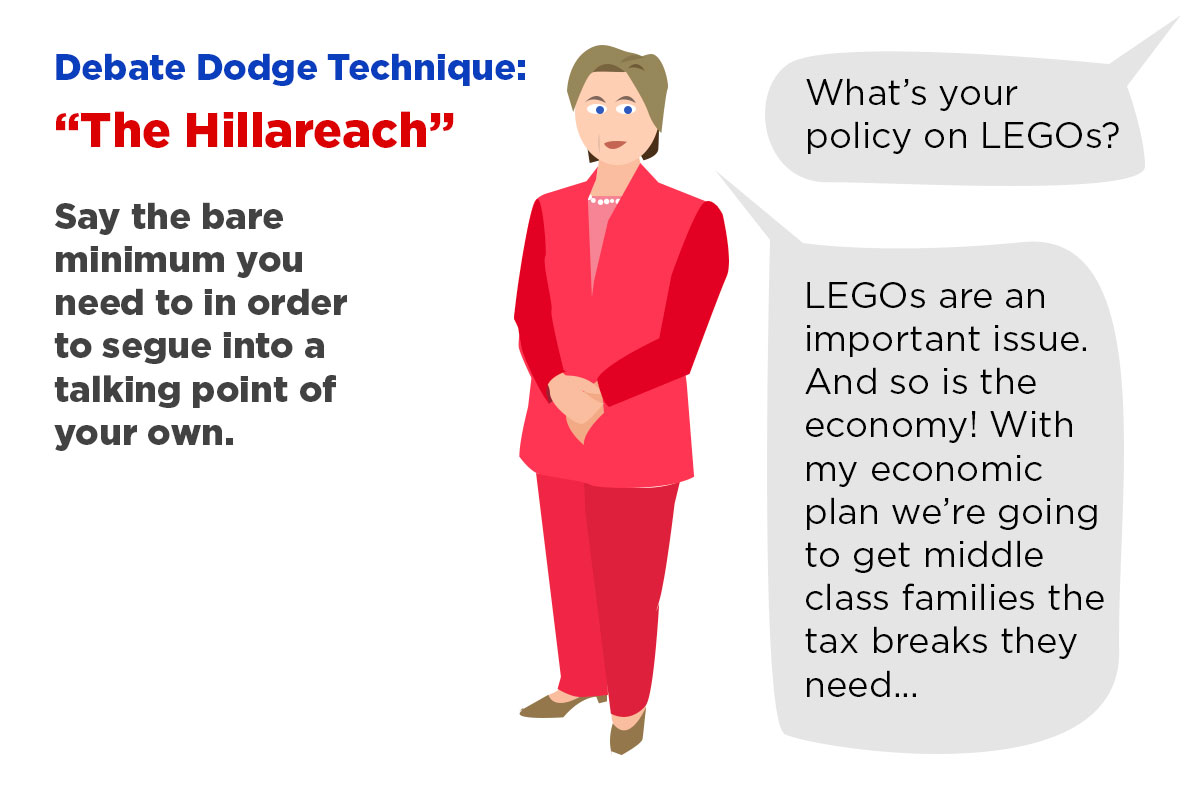
The first type of dodge is when you quickly say whatever you need to in order to reach a talking point of your own. This is the classic politician’s move. It’s literally what I was taught in the first five minutes of PR training when I first started getting asked to go on cable TV news shows.
In the following clip during the 2016 Presidential debates, Hillary Clinton is asked if she’d broken a previous promise about the Clinton Foundation not doing “pay to play,” and instead of directly answering that question, she talks about the work she did as Secretary of State and the work the Clinton Foundation does:
She’s not lying per se. But she completely avoids answering the question, while making herself look pretty good in the process.
Next we come to The Hannittack (not to be confused with, but certain to give you the risk of, a heart attack):

A very common dodge is to take the question and turn it around on your opponent or their allies instead of answering it.
This can be accomplished by bringing up an apparent hypocrisy related to the topic, pointing out that an ally of whoever you’re debating did something bad one time, asking your debate opponent an aggressive question, or pointing out an alleged error (real or perceived, big or tiny) in something they said. The point is, you’re doing this instead of answering the question.
This puts the other person on the defensive, and gets you off the hook. Even better: don’t let them finish asking the question before you jump in with your attack. Repeat the same attack again and again if necessary.
One of the most painful examples of this in recent memory is the below exchange between FOX News’s Tucker Carlson and Newsweek’s Kurt Eichenwald. As we’ll discuss later in this post, Carlson is a ninja master of dirty debate tactics, but if there’s one thing I respect him for, it’s his tenacity when it comes to question dodgers. In this clip I actually start to feel bad for Carlson as over and over again his guest (Eichenwald) insists that he wants to answer Carlson’s question and then proceeds to dodge it by attacking Carlson.
It’s particularly bewildering, because Eichenwald is arguing that Carlson won’t let him answer… while not ever answering.
Next we have The Conword:
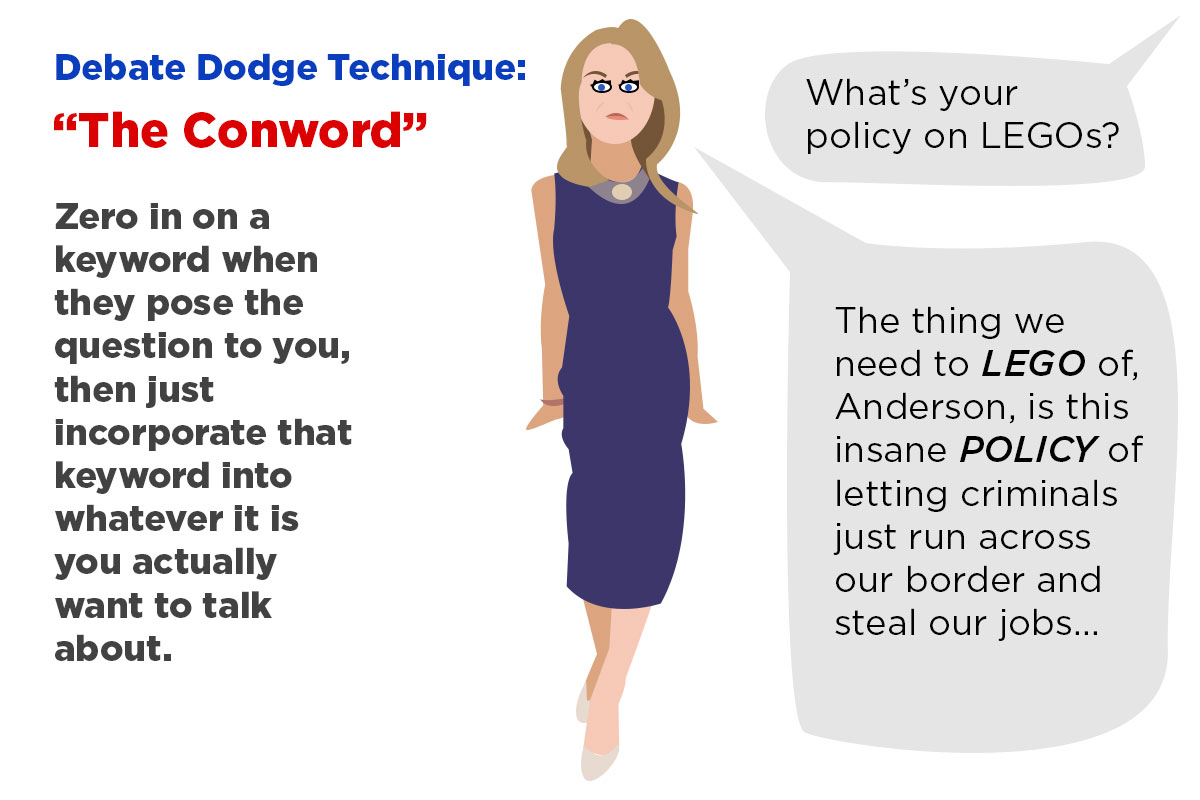
One of the most clever ways to dodge is to zero in on a keyword in the question you’re posed, then go into a talking point of your own that incorporates that keyword.
This makes it appear that you’re answering the question, but you’re getting away with not answering it at all.
Even better: use your talking point to put the other person on defense.
This excellent explainer video by Carlos Maza breaks down publicity whiz Kellyanne Conway’s signature usage of this dodge tactic:
Next we have The Colbert Retort:
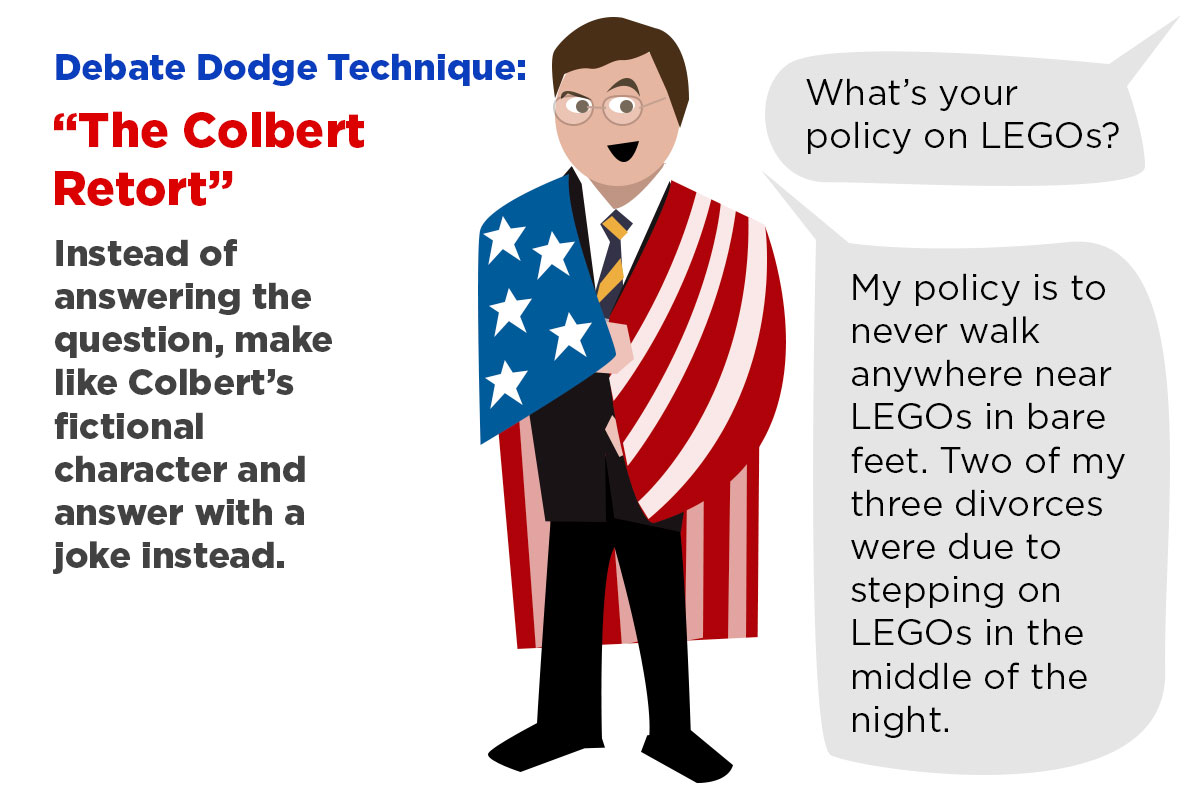
Stephen Colbert’s fake persona in his long-running satirical news show The Colbert Report was a purposely infuriating debater. His signature move was cracking a joke instead of answering his “opponent’s” question.
This, which I call “The Colbert Retort,” can be an incredible crowd-pleaser. And it’s fine if you are running a comedy show and not an actual, real-world-consequences debate.
But if your goal is intellectual honesty, you shouldn’t do this unless you plan on also answering the question.
Donald Trump gets two dodges named after him, since he’s one of the most prolific dodgers on TV today. (He’s also shown on TV more than anyone, so he gets the chance to do it a lot more than other people who might be inclined to dodge the shit out of questions, too.)
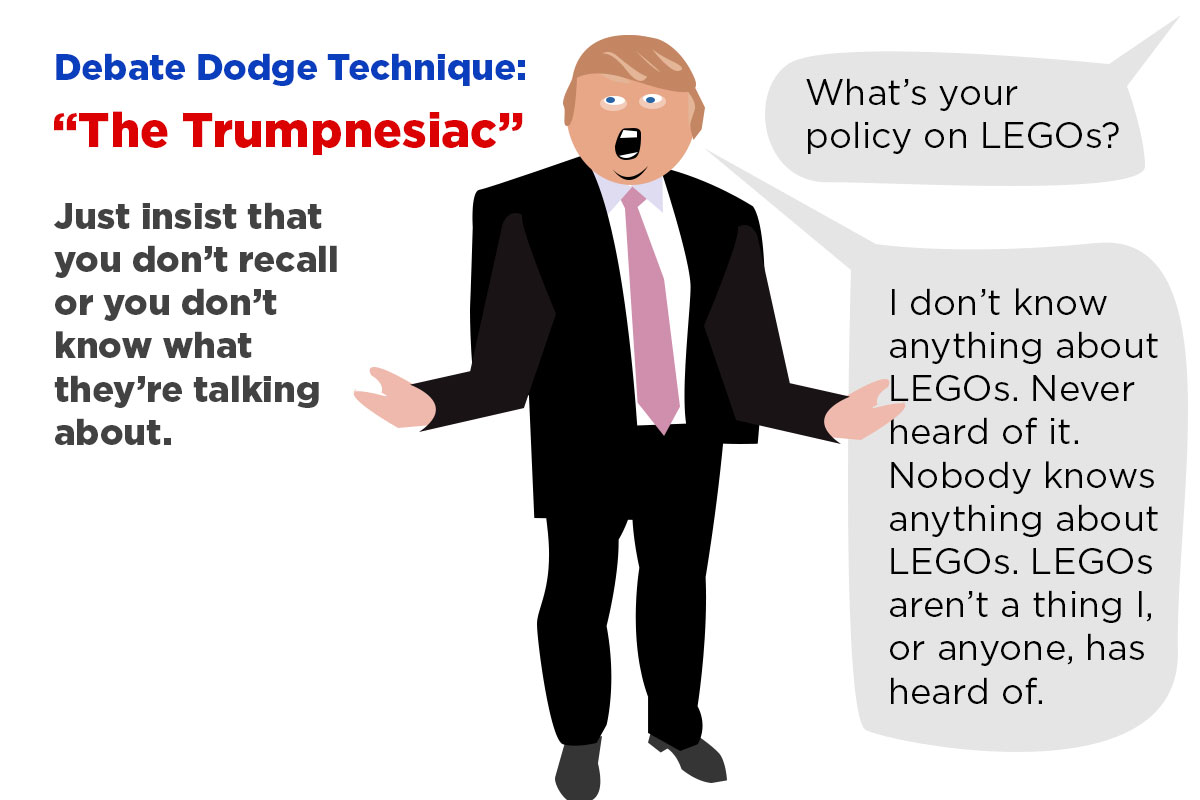
The first is “The Trump-nesiac.” This is where you just insist that you don’t know what they’re talking about. It’s not dishonest if you actually don’t know about the thing you’ve just been asked. But it’s a dodge—and an outright lie—when you claim amnesia after you’ve already talked or tweeted about the very thing you just said you never heard of.
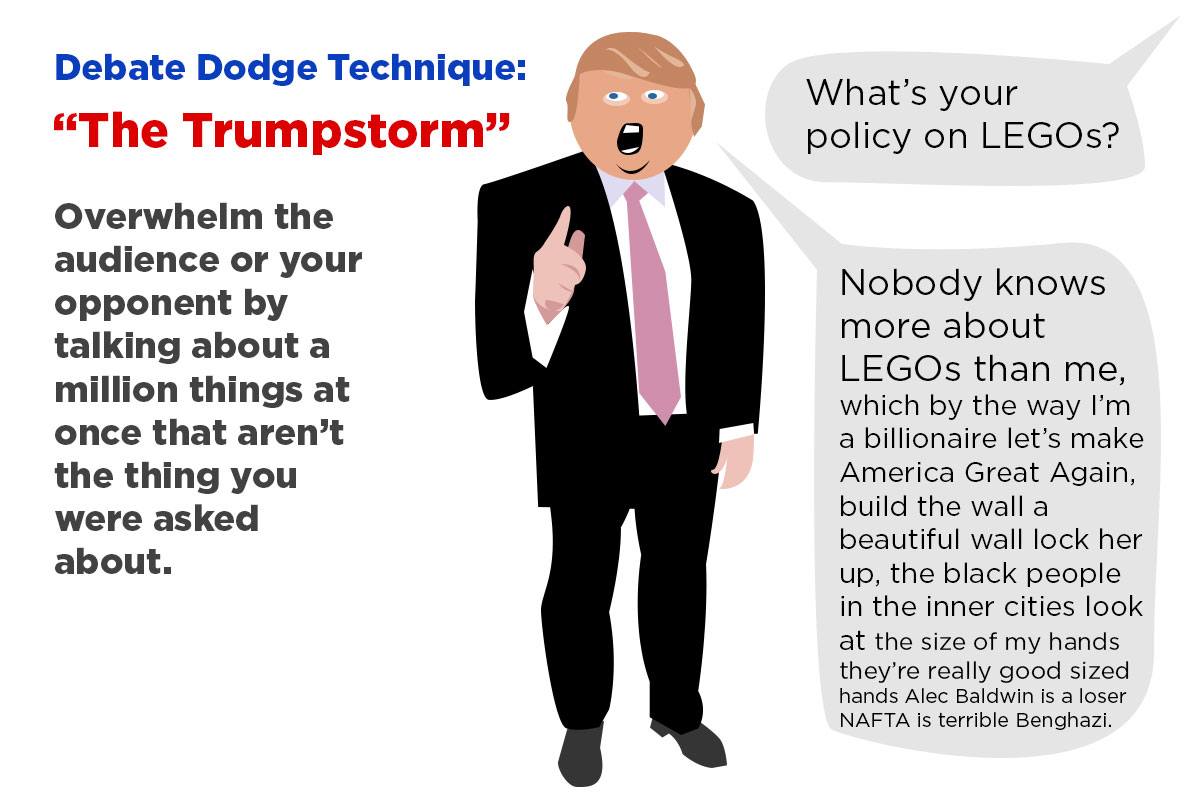
Trump Dodge #2 is “The Trumpstorm.” This is where you overwhelm the audience or your opponent by talking about a dozen things at once. It’s like a DDOS attack on the information processing center of your brain.
Hopefully by the end of the storm the audience forgot what you were supposed to answer—or got distracted by all the shit you just said.
Funny side note: someone on LinkedIn already misconstrued this as an ad hominem fallacy. It’s only an ad hominem fallacy if it’s used to attack an unrelated argument. In this case, we’re talking about something someone irrefutably does, on camera, all the time. It’s like saying calling fried chicken “greasy” is an ad hominem.

Also, as we’ll discuss in the next section, using the fact that someone used a fallacy to discredit their position or argument is itself a fallacy (called The Fallacy Fallacy), so even if this guy insists that the name Trumpstorm is an ad hominem fallacy, that itself doesn’t invalidate the point—which is that overwhelming people with information without answering the question is a dodge.
*
There is only one intellectually honest way to dodge a question. And that’s to actually say that you don’t want to answer the question, or you don’t think the question is worth answering.
In this clip where he’s asked about alien life, candidate Obama addresses a question he doesn’t care about in an intellectually honest way by admitting he doesn’t know the answer:
(As an aside, a reader brought this up: In his September 2018 Senate testimony, Supreme Court Justice nominee Brett Kavanaugh dodged a whole bunch of questions. Here’s an infographic of every time he did. Many of the dodges were not dishonest; he simply said he doesn’t want to answer. But people gave him grief for this, because a Supreme Court Justice should have had an answer to many of these. He did, however, also employ some intellectually dishonest dodges, primarily when ducking questions about whether he was in favor of FBI investigations of assault allegations against him.)
To give Mr. Trump a bit of credit as well, in this interview with Stephen Colbert (the not-in-character Colbert), the then-presidential candidate dodged a question the honest way by just saying he didn’t want to answer it:
Satisfying? No. But it’s not dishonest to say you don’t want to answer.
It’s important to distinguish this sort of thing if we’re trying to be intellectually honest. Just because you don’t like someone or their point of view doesn’t mean that it’s okay to not distinguish when they’re being straightforward or honest—and when they’re not.
Political discourse often devolves into accusations that everything someone says is wrong or bad, and that doesn’t get us closer to progress either.
Speaking of things that don’t get us closer to progress, the next type of intellectual dishonesty we’ll discuss is especially troublesome…
What does fallacy mean?
INTELLECTUALLY DISHONEST DEBATE MOVE #2: SAYING THINGS THAT DON’T MAKE SENSE, BUT PRETENDING THEY DO

IS MAN INHERENTLY GOOD or bad?
Before we get back to more real political debates, I’d like to introduce the idea of the least obvious type of intellectual dishonesty—logical fallacies—through a neutral example: a debate on the fictional NBC TV show Community.
In the ninth episode of Community, two teams debate the issue of man’s inherent goodness in hilarious fashion in a school gymnasium. In the process, they show us some terrific examples of using logical fallacies that don’t prove you’re right, but may make the audience think you’ve done just that.
A logical fallacy is basically just logic that doesn’t make sense when you scrutinize it. Fallacies are intellectually dishonest because they take something that doesn’t make sense and pretend it makes sense.
It’s common to be unaware you’re using a logical fallacy. So you can employ this kind of intellectual dishonesty without being a “liar” per se. For that reason, I think we should be gentle to people who do this inadvertently.
It’s especially shitty to use a fallacy if you know better—which I’d argue that anyone running for public office ought to. But in either case, fallacies get in the way of progress, so it’s important to be able to identify them.
OK. Let’s take a look at some fallacies in action, via Community:
In this clip, a debater played by Aaron Himelstein quotes a German poet named Franz Wickmeyer, who says that snow falling to earth is pure, and it’s the Earth that makes it dirty. Therefore, Himelstein says, man is also pure initially, before the Earth corrupts him.
Though he gives a marvelous performance, underneath it the debater has employed several intellectually dishonest tactics, including three fallacies:
-
An appeal to authority/expertise. Just because a wise person said it, doesn’t mean it’s true.
-
A false analogy. People and snow are very different, and they come to Earth in very different ways. It’s intellectually dishonest to compare them in an argument about good and evil. (Just because snow and men both melt at a high dddtemperature doesn’t mean that “man is melty.”)
-
An appeal to emotion. Just because Himelstein cries when he makes his point doesn’t mean his point is true, or more true than if he hadn’t gotten emotional.
In addition to these fallacies, the debater also traffics in deception (we’ll get to all the tactics for deception shortly). Franz Wickmeyer is not a real person, so the quote is moot anyway. Of course, we could assume that in the fictional world of Community Wickmeyer is real, but it’s worth pointing this out here because of how often quotes get twisted and go un-fact-checked in the heat of a real-life debate.
Further, part of the gag in this episode is that the opposing team is upset that they are debating a man in a wheelchair. The wheelchair man (Himelstein) purposely uses his disability as a way to get sympathy from the judges. This tactic, called “appeal to sympathy,” is fallacious if it’s used to try to sway the audience, because feeling sympathetic for the guy doesn’t mean he’s liable to be more right than his opponent.
Now here’s his debate opponent’s rebuttal:
The character played by Joel McHale counters by summarizing a research experiment, The Stanford Prison Experiment, where “21 out of 21 students abused their fellow students.” This one is a more clever debate move, but it’s also riddled with logical fallacies:
-
Anecdote / argument from small numbers. This is another way of saying that just because one time a thing happened, it doesn’t mean it always happens. Science must be repeatable to be taken as law—which the Stanford Prison Experiment was not. This argument is also a…
-
Non sequitur. Just because 21 students abused their fellow students doesn’t mean that “Man is bad.” This is a logical leap that’s missing some steps for it to make sense.
Further, McHale makes a factual error. The Stanford Prison Experiment has been soundly discredited by other scientists as a fraud. McHale may have been unaware of this, which would make this a mistake rather than an overt deception. But a fact check would reveal that this is not a valid argument.
But McHale delivers the real whopper next:
He one-ups his opponent’s quotation with a quote from Jesus. This is intellectually dishonest because:
-
It’s still an appeal to authority. He’s just saying that his authority is a better authority. (This debate is a secular debate, so there’s no agreement/assumption here that everything Jesus said was absolute truth. If this were in a Church where everybody believed in Jesus’s every word as truth, that might be a different story.)
-
It’s an argument from “age.” He implies that his quote is better because it’s more ancient, which is a classic logical fallacy. You could just as easily argue that a newer quote is better than an old one. Neither is necessary true.
-
It’s sloganeering. Just because what you say sounds catchy, doesn’t make it true.
After that, each team throws counterpoints back and forth at each other. Each is an example of a non-sequitur or an argument from small numbers which doesn’t actually “prove” man is inherently good or bad. My favorite is the last one:
Finally, in a last ditch attempt, Himelstein engages in one final tactic—which blows up in his face when the same logical fallacy is used against him:
Community is a hilarious show. But unfortunately, many political debates we see on TV—from CNN panels to presidential face-offs—are just as riddled with fallacies as this fake one. And we’re often unaware it’s happening in front of us. (See also: Facebook.)
People often employ fallacies to support their viewpoints because of what psychologists call “motivated reasoning.”
This is when you’re motivated to find support for a certain point or a certain side/identity, and so you latch on to things that support your cause without thinking critically about it—and conversely you ignore things that might shoot holes in any argument that supports your motivated outcome.
This is a very human thing to do. It’s only nefarious if you do it on purpose. But it’s unproductive whether it’s conscious or not.
For that reason, it pays to understand the most common fallacies debaters tend to employ when arguing for even something they believe in.
THE MOST COMMON LOGICAL FALLACIES USED IN DEBATES:
The website yourlogicalfallacyis.com has an awesome interactive map of fallacies (and a poster you can buy) that explains each better than I can. Click this image to explore them:
For some rapid-fire examples of logical fallacies, this video by Teach Argument breaks down 15 logical fallacies in 3 minutes of candidate Donald Trump’s first presidential campaign speech:
Once again, fallacies are intellectually dishonest because they’re saying something that doesn’t make sense, as if it makes sense. Some are trickier to spot than others, so definitely refer to yourfallacyis.com (or you can stay apprised of my upcoming course on practicing spotting them by subscribing to The Snow Report.)
Now let’s move on to the next way debaters cheat. This one, in my opinion, is the slimiest:
THE SUBTLE ART OF NOT GIVING A F*CK ABOUT THE TRUTH
INTELLECTUALLY DISHONEST MOVE #3: DECEPTION
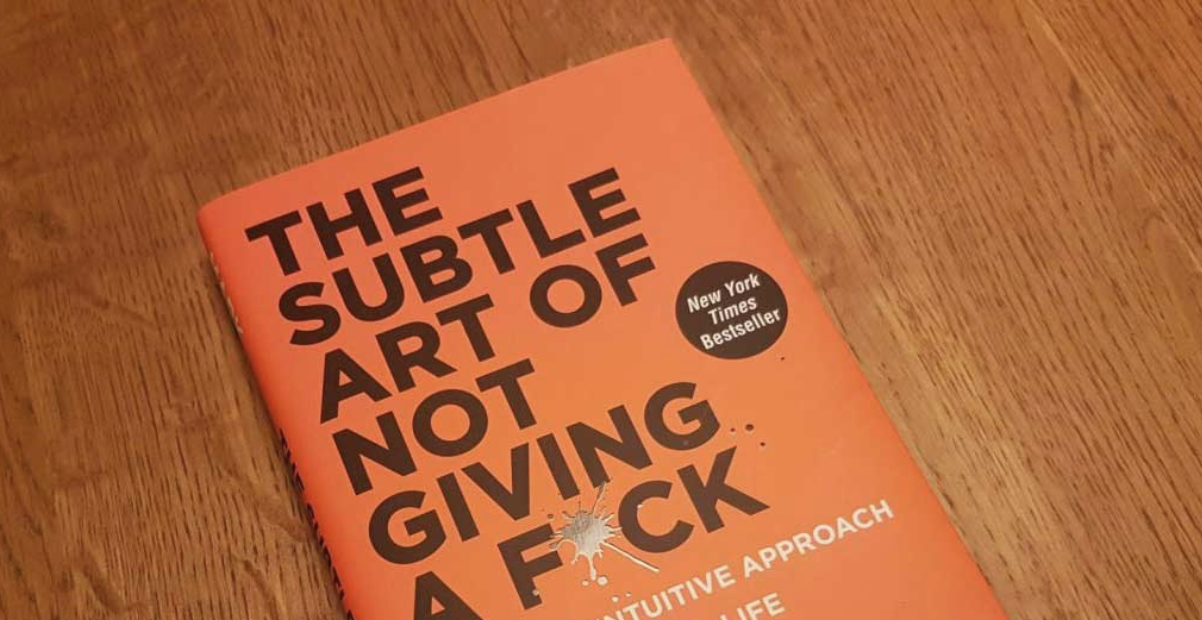
There’s more than one way to deceive than to outright lie.
The most clever (as well as the most ignorant) way to employ intellectual dishonesty is to be deceptive without looking like you’re outright lying.
Here are some of the main ways to do it. Each of these examples below links to Politifact analysis that explains why they’re deceptive—whether the deception was intentional or not.
(CLICK ANY OF THE QUOTES TO READ THE FULL EXPLANATIONS)
Exaggerating: claiming something that’s almost true… is not true:
Assuming or insinuating facts not in evidence: putting forth half-true or untrue facts claiming that “everyone knows,” insinuating “of course they did,” or assuming someone did something because they belong to a group who did it, etc., when there’s no clear evidence:
Rejecting facts as mere opinion: refusing to acknowledge facts so that you can claim you disagree.
Inflating credentials: claiming that your or someone you’re using as a source of an argument is more accomplished than they are (often used with an Appeal to Expertise fallacy).
Denying or hiding your conflicts of interest: not acknowledging when you have motivated reasoning, so people don’t dig into your arguments like they would if they knew.
Citing hearsay: when there’s no evidence to back up your opinion (or your lie), claim that people are saying it:
Claiming the jury is still out on established facts: rather than outright denying the truth, claiming we’re not sure is dishonest (this is the climate change denial tactic #1, and may soon be the tactic corporations use to ignore the risks of runaway AI technology, according to the Global Catastrophic Risk Institute).
Claiming an issue is settled when it’s not: this is often an attempt to use a bandwagon fallacy:
Fudging the definition of words: claiming that well-defined words are ill-defined, redefining words, or otherwise weaseling your way through technicality rather than answering honestly:

“It depends on what your definition of is is.”
Being vague / weasel words: purposely not being clear so you can wriggle out of the truth.
Half truths / cherry picking: saying something that’s technically true but leaving out something that would materially change people’s understanding of the facts.
Ignoring net effect: this is a version of half-truth, where you explain the factual effect something had/will have, but leave out the other/side effects that are material to the overall effect.
Misinterpreting or skewing data: usually a result of half-truths or ignoring net effect, this is where you use statistics to back up a claim that, upon analysis, is bunk:
Tiny change that changes everything: pluralizing the singular, converting past tense to present, using a slight misquote that changes the meaning of something, or repeating sarcasm or joke without indicating it was sarcasm or a joke.
Putting words in people’s mouths: claiming people said or believe something that they didn’t say (common way to set up a Strawman). This is especially nefarious when it’s buried in the middle of a different argument. [See the whole Tucker Carlson section above.]
Playing up your confidence or indignation to dismiss the idea that you’re outright lying: acting up in order to cover up the fact that you’re lying is a favorite tactic of both politicians and marital cheaters.
Passing the buck: claiming that someone else did the thing that you did, or said the thing that you’re saying, as an excuse to do or say what you’re doing, is dishonest:
Claiming you never said something you said (or wrote): nitpicking an argument against you by lying about what you stated before is another common sight in both marital arguments and Trumpian politics:
Making shit up: baseless claims are outright lies, but sometimes conspiracy theories are rooted in strange non-sequiturs and don’t “feel” like outright lies, so they go in this category. Too-good-to-be-true wellness products like “negative ion bracelets” that claim to fight off disease fall into this category. This is the slimiest of all:
And finally, before we get to how to stop all this, there’s one more list of dishonest tactics to cover.
DIRTY DEBATING
INTELLECTUALLY DISHONEST MOVE #4: POKING PEOPLE IN THE EYE

Before we start this section: There’s a small chance Tucker Carlson’s people see this and want to pounce on me. I would actually be delighted to speak with Tucker about this stuff if he has beef with my critique of his debate tactics—or even better, to have an honest debate with him about a topic we both care about. Given the huge disparity between my profile/platform and Carlson’s, it would be very cool of him to reach out and talk. I’ll happily amend this post based on the conversation we have! Come on, Tucker! Let’s do this!
*
TUCKER CARLSON ALMOST NEVER loses an argument.
After CNN canceled its debate show Crossfire, Carlson eventually went on to host one of the most-watched news shows on cable, Tucker Carlson Tonight. On it, Carlson has burnished his reputation of a master debater. He’s very good at calling out dodgers and deceptive people.
But in the process, Carlson also frequently demonstrates intellectual dishonesty himself in the way he argues.
I call it, “dirty debating,” or rendering the other person invalid without having to fully and honestly address their true arguments.
This is at best something people do accidentally. But it’s often deliberate bullying. At worst, it betrays a person’s willingness to do anything to win an argument—honest inquiry be damned.
Fascinatingly, Carlson manages to do this under the guise of honest inquiry. And to be fair, he occasionally does manage to be convinced by one of his debate opponents, such as this episode where he “takes on” an advocate for veganism.
Episode after episode of Tucker Carlson Live is described as “Tucker takes on [opponent].” But more often than not he takes them down.
That’s not because Carlson is right about everything he thinks—or even that he has conviction in everything he says. (He’s open about that.) It’s because he’s smart enough to always set up his skirmishes in a way that he can never lose—and so the absolute best his opponents can do is also not lose.
But usually they lose.
Carlson uses a host of dirty tactics to do this: nonverbal pageantry (eye rolling, voice raising, mock surprise), deceptive wordplay, name calling, mockery, selective quotations, buried insults, accusations that the other person is using the same behavior Carlson uses, offhand insinuations, and trap questions. These tactics strip his debate opponents down and make them look stupid at best, and like liars if possible. He frequently puts words in other people’s mouths and doesn’t give them the chance to defend his mischaracterizations by yelling at them to “ANSWER THE QUESTION.”
After watching hours of debates on his show, Tucker Carlson Live, I put together a flowchart of his debate strategy when he REALLY wants to take someone down:
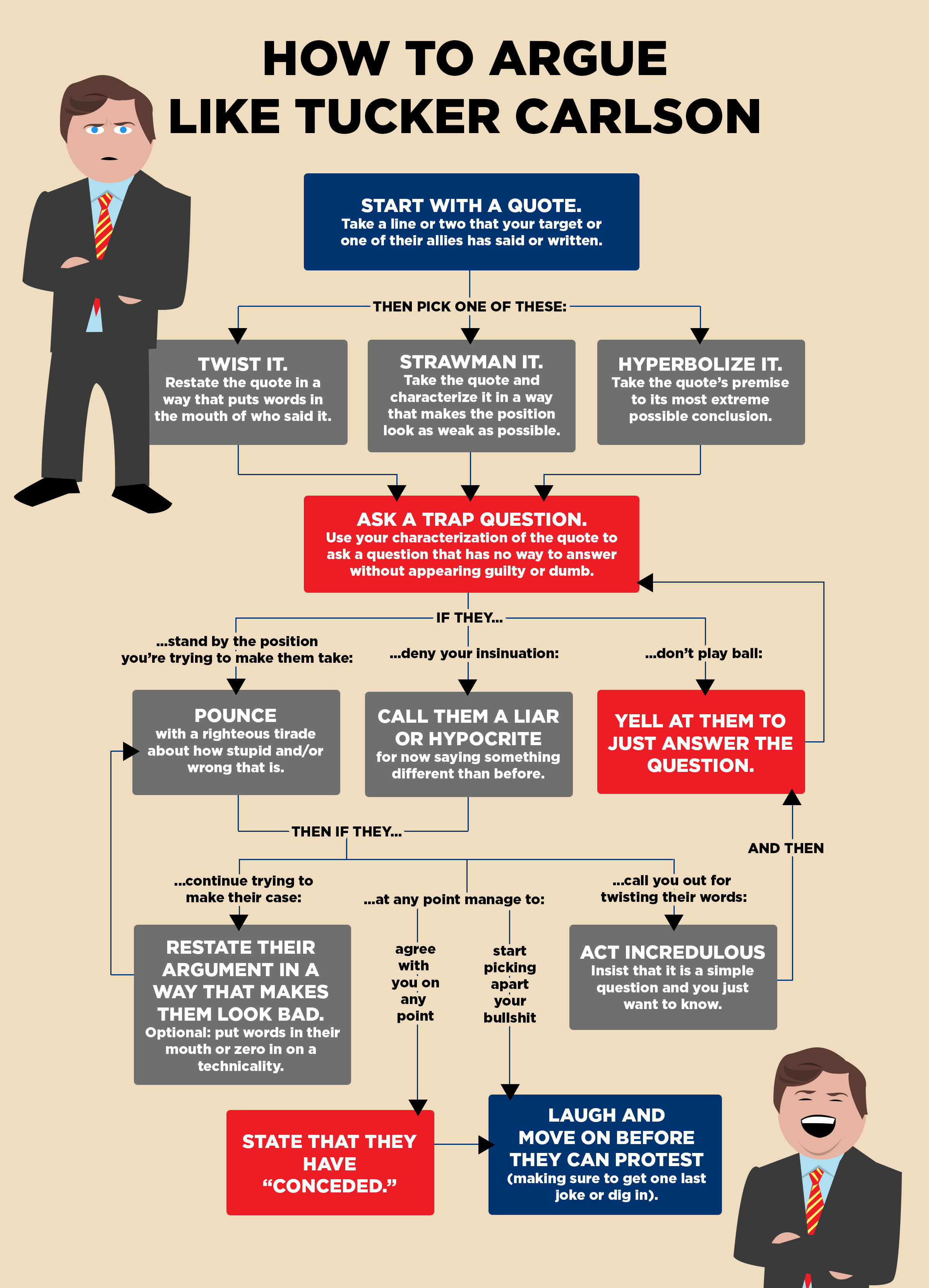
Now sometimes Carlson’s debate opponents are wrong. Frequently they’re intellectually dishonest. He especially excels at taking down people who’ve clearly had media training for avoiding hard questions.
But that doesn’t excuse his own behavior. And it only masks the fact that a man with his enormous platform (a prime time slot on a big cable channel) and a high IQ could do a lot of good in the world if he was more intellectually honest.
I would feel bad using one person for so many examples of dishonest behavior, but the real-world consequences of Carlson’s rhetoric are pretty stomach-curling. The following video (again by Carlos Maza) illustrates why Carlson is a favorite pundit of white supremacists. Carlson claims he himself isn’t racist, but he feeds racists when he has the talent and resources to do the opposite:
If we want to make our debates productive and have our discourse help us make progress, we need to kick dirty debating to the curb. Below is a breakdown of some of the most common things to watch out for, as illustrated (primarily) on Tucker Carlson Tonight:
ASKING LOADED QUESTIONS / FORCING THE OTHER PERSON INTO A FALSE CHOICE FALLACY:
When you ask a question that has a built-in assumption that makes it impossible to answer without looking bad, you’re not honestly trying to exchange ideas and find truth; you’re trying to trap the other person.
Take this clip, for example, where Carlson tries to trap his guest into quantifying how much of an illegal thing we should do:
Carlson’s question is intellectually dishonest because it leaves no room to argue, say, that we are the ones in charge of what constitutes legal and illegal immigration, and that we should change the law.
A much more productive question than “How many people should we allow in illegally every year?” would be, “How can we change our immigration system so it’s more safe, fair, and maximally beneficial?”
But he’d rather make his opponent—and by proxy, their political allies—look like a fool.
This kind of question is like asking, “What time of day do you plan to kill your husband?” It presumes you want to, you know, kill him.
Another version of the trap question is where you force your opponent into a corner by asking them a multiple choice question and then supplying the options for them to choose from. E.g.: “Which is it, x or y?”
NAME CALLING / MOCKERY:
This is particularly not cool because it’s not only shitty to call someone names when you have more power than them, but it also tends to escalate their emotions—which is bad for a logical discussion of issues and ideas. Further, tearing your opponent down instead of their arguments, and thereby weakening the validity of their arguments in the minds of the audience, often happens while speaking about something else. Hence the victim then either must veer off topic and address the insult, or ignore the insult and be potentially diminished in the eyes of the audience.
Here’s a particularly egregious (and admittedly hilarious) example of Tucker Carlson doing this:

During an interview with lawyer Michael Avenatti, Carlson uses a text overlay to describe his debate opponent as a “creepy porn lawyer.” This buried mockery diminishes Avenatti’s power in the audience’s eyes, and he can’t do anything about it.
(Note: Not only is “creepy” an insult, and totally subjective, but it’s deceptive and reductionist to call Avenatti a “porn lawyer.” He is a lawyer with many clients, one of which is a former porn star. It’s kind of like introducing Tucker Carlson a “vegan debater” because of that one time he debated a vegan on his show.)
(Note 2: I wrote this before Michael Avenatti was put in jail on extortion charges. I’ve been waiting for a reader to email me saying, “Why are you defending a criminal?” Of course, intellectual dishonesty is still dishonesty even if it’s used against a dishonest person. So I’m glad no one’s fallen into that trap—or at least, no one who has emailed to berate me has brought it up.)
ACCUSING THE OTHER SIDE, WITHOUT EVIDENCE, OF FALLACY, BAD FACTS, OR SOME OTHER BAD DEBATE TACTIC:
This is a classic dodge, but it can be employed as an attack as well. Making your debate opponent respond to false accusations once again distracts from the topic and is not productive. Tucker Carlson uses this tactic all the time to throw his interviewees off:
After spending a whole interview asking Nye politically charged questions, he then accuses Nye of using “the language of politics” when Nye is not.
Then Carlson accuses Nye of “bullying,” which is actually the thing that Carlson is doing to Nye.
Carlson then tears Nye down by telling him that he is not a scientist (Nye is), refuses to listen, and finishes up with the declaration, “I’m open minded, you are not!”
It’s the same reason this tweet is ironic:
ALWAYS ACTING LIKE YOU’RE WINNING EVEN IF YOU’RE NOT:
This is intellectually dishonest if it’s used to manipulate the audience—or if you actually did not win. On the rare occasion that Carlson is matched by one of his debate guests, he responds by laughing and/or by ending the segment while getting a last word in that makes it seem like he won.
But the best recent example of this is when President Trump claimed a “very Big Win” in the 2018 midterm elections when, in fact, his party lost both in popular vote and Congressional seats:
DISMISSING OR PROHIBITING POINTS OF VIEW FOR SUPERFICIAL REASONS:
This is when you use an Ad Hominem or discrimination to invalidate what someone has to say.
In this clip, Tucker Carlson tries to invalidate his guest’s political point of view by reading headlines of articles she’s written about women’s fashion, implying that she’s dumb because she writes for Teen Vogue:
Anything that shuts out valid points of view is harmful, but it’s especially grimy when justified this way.
The full 10-minutes of the above Tucker Carlson interview with Lauren Duca is actually a good example of the last three dirty debating tactics in our list. I’ll embed it after the descriptions of each of them if you’d like to watch it all:
BURYING ARGUMENTS OR CRITICISM IN ARGUMENTS ABOUT OTHER THINGS:
This one’s similar in ways to The Trumpstorm dodge. When you slip in criticism while talking about something else, you make the opponent have to choose whether to respond to the topic at hand, or to respond to the buried criticism. This intellectually dishonest tactic can easily derail a debate from the topic at hand.
INTIMIDATING / INTERRUPTING / BADGERING:
It should go without saying, but shutting down your opponent with aggression rather than letting your arguments speak for themselves is both intellectually dishonest and shitty.
DISMISSIVE THEATRICAL BEHAVIOR:
Using your voice or body language (eye rolls, using a childlike voice, mocking laughter, etc.) to make your opponent look bad and you look good, rather than letting your logic and arguments stand on their own, is a manipulative and dishonest tactic:
Ok, that’s a lot of heinous stuff to keep track of. Unfortunately, recognizing intellectual dishonesty is only the skirmish. The battle starts when we try to stop it.
HOW TO GET A DISHONEST DISCUSSION BACK ON TRACK
A FEW SCRIPTS FOR CURBING INTELLECTUAL DISHONESTY AND DISTRACTION

IN THE RECENT 2018 debate for the Governorship of Florida, the debate host asked candidate Ron DeSantis a straightforward question: Did he think President Trump was a good role model for kids?
DeSantis spent the full minute he was allotted to answer talking about how he liked to play with his kids, Trump’s proposed wall to Mexico, and the US embassy in Israel—a classic Trumpstorm dodge where he didn’t answer the question at all.
His opponent, Andrew Gillum, who ultimately lost the election, adeptly pointed out the intellectual dishonesty in DeSantis’s response by simply asking the moderator to repeat the question.
“I’m confused by the question. How did we get to Israel?”
The moderator then repeated the question, and the audience laughed when they realized that DeSantis had dodged it:
In many debates, a dodge like DeSantis’s would go overlooked. The moderator didn’t stop him from being intellectually dishonest, so his opponent did. Ideally, in a setting with a moderator, he wouldn’t have to.
And that’s perhaps the most actionable point of this entire post: The moderators of debates—and in the case of politics, that means journalists—have a responsibility to put honesty and the audience first. And that’s really not happening very much these days.
The only person in a football game who can stop bad behavior is the referee. Doesn’t matter if the players like him or hate him, the referee keeps the game fair.
But this isn’t what happens in debate on TV.
The first, second, and third rule of curbing intellectual dishonesty is what Gillum had to do on his own because his debate moderator didn’t: calling it out.
To do that, though, you first have to get the person to stop. And ideally, if the goal of the debate is to truly exchange ideas, we should let the person who just did wrong try again if they would like. After all, it’s a fallacy to discredit an idea just because the person making an argument for it argued badly.
Many people won’t respond well to being called out—and often won’t just stop to let you do it—so curbing bad debate behavior takes a bit of finesse. Gillum’s call-out above is a good example.
In other words, though in practice stopping intellectual dishonesty is not easy, the formula for doing so is straightforward:
-
Stop them.
-
Identify what’s happening.
-
Rewind and try again.
Ideally, we can do this without escalating emotions or using any dirty behavior of our own. In other words, being kind while being firm.
This is much easier for a debate moderator to do than for a participant. But here’s how to do it in any case.
HALTING FALLACIES:
Some debaters are more aware of the fallacies they employ than others (and shame on those who do). In either case, stopping a fallacious argument can be accomplished with minimal ego-bruising. Doing so just requires whoever calls out the fallacy to do so with kindness and respect.
Here’s the script I recommend for debate moderators who spot a fallacy:
-
(Stop them.) “Let me stop you for a second.”
-
(Gently point out the fallacy.) “There’s a logical fallacy in what you just said: Appeal to Authority. Just because an authority figure said something, doesn’t mean it’s true.”
-
(Rewind.) “Do you wish to restate your argument another way?”
Moderators have more authority and can be more direct in their calling out of bad behavior than a participant, who may come off arrogant if they come in strong like a referee. For that reason, I recommend a gentler script if you’re in a debate with no moderator.
Here’s the script I recommend for when you spot a fallacy in a non-moderated debate:
-
(Stop them.) “Let me stop you for a second.”
-
(Gently point out the fallacy. E.g:) “I’m genuinely interested in understanding your point of view. But just because an authority type figure said something, doesn’t mean it’s true.”
-
(Rewind.) “Is there another way you can back this viewpoint up so that I understand?”
Even if the person you’re saying this to is being belligerent, you being reasonable and kind—but firm—like this can help you cut through bullshit without making the other person lose too much face.
DETERRING DODGERS:
Unfortunately, a lot of good dodgers are hard to get to stop talking. This is why I think an ideal setup for a debate involves rules that debaters are not allowed to talk over the host, plus an actual physical way to stop a debater that goes off the rails. And by that I mean turn off their microphone or put a giant stop sign in their face.
For both moderators and participants, I recommend the following script when someone dodges a question:
-
(Stop them.) “Let me stop you right there.”
-
(Acknowledge them.) “I hear what you’re saying.”
-
(Rewind them.) “I’d like to hear your answer to the question, [repeat the question]?”
If they proceed to dodge again, I recommend a more firm script:
-
(Stop them.) “Let me stop you again.”
-
(Point out what they’re doing.) “You’re not answering the question.”
-
(Firmly rewind them.) “Let’s rewind and address the question.”
At this point, a dedicated dodger may employ a different dodging tactic, raise their voice, or resort to a logical fallacy or deception. It’s important not to let them off the hook if you want the debate to be productive.
Watch in this memorable clip from the 2016 Presidential debates as Anderson Cooper refuses to let Donald Trump off the hook when he repeatedly tries to dodge:
One thing that a good debate host will not do to stop a dodger, however, is force the debater to give an answer from a limited set of choices, if there are alternative answers.
Forcing someone to say “yes” or “no” is a tempting tactic, but it’s not fair if a valid answer could be more complicated than that. In the case of the above clip, either Trump did or didn’t commit the sexual assaults he bragged about to Billy Bush—there’s no alternative—so it was fair to ask him for a “yes” or a “no” in this instance.
CURBING DECEPTION:
Often deceivers won’t acknowledge that they’re lying, so you have to do some extra work to work around them. This is where I recommend not rushing debates, so you can take the time to verify facts. Having a debate over correspondence—like they did in the olden days—is a great way to accomplish this.
In a real-time debate, I recommend having a panel of judges who can fact-check and call out deception. E.g.:
-
(Stop them with a whistle, buzzer, etc., and turn off their microphone.)
-
(Identify the deception.) “We’ve stopped you because you just made a deceptive statement. You said [x]. However, that is [explain the deception].”
-
(Clarify the real fact and its source.) “The accurate fact, according to [source], is [y].”
-
(Give them the chance to explain themselves or recover.) “In light of the facts, would you like to re-wind and continue explaining your viewpoint?”
It’s harder to police deceptive statements in an informal debate setting. For that, I recommend using a script like this:
-
(Stop them.) “Let me stop you right there for a second.”
-
(Identify the deception.) “You just said [x]. However, I believe that’s inaccurate.”
-
(Clarify the real fact and its source.) “The truth, according to [source], is [state it accurately].”
-
(Give them the chance to explain themselves or recover.) “Can we rewind to where we left off?”
It’s really hard to pull this off without seeming like a jerk. And it’s also hard to take being called out like this without your ego smarting a little bit.
So if the person allows you to get through this script without jumping in, good on them.
But people will sometimes respond by attacking the facts or their source, using another deception like claiming that the facts are just an opinion—or resorting to dodging, etc.
In some cases, they’ll combat being called out with an outright lie.
This is where I think the role of a good debate referee is especially important. At the end of a round of debate, the moderator should sum things up, so the audience is crystal clear on what the facts are.
That’s what journalists are supposed to do. And I think if journalists took that role upon themselves once more when it comes to public discourse—with real rules that make them more like referees than players—the profession itself would get some of its old credibility and power back.
NEW RULES FOR INTELLECTUALLY HONEST DEBATE
LET’S SET A HIGHER STANDARD AND CONCRETE GUIDELINES FOR PRODUCTIVE DEBATES—IN POLITICS AND ELSEWHERE
The way we set up political debates on TV—and the way they naturally unfold IRL—leads to high potential for intellectual dishonesty. And unfortunately, the rules of presidential debates actually make it hard for us to curb a lot of it.
In the 2012 debates, Romney’s and Obama’s teams negotiated so that there would be no follow up questions when the candidates gave their first answer. That is not a recipe for getting at the truth. And the 2016 debate rules were kept secret from the public. (What we do know is that in those debates, candidate Donald Trump tried to get it so the moderators were not allowed to fact check when candidates lied about things.)
But the networks that air the debates have the power to set rules. Which means they can decide to hold politicians accountable for intellectual honesty if they want.
In other words, journalists could take it upon themselves to police intellectual honesty. To do so, though, we need everyone to understand the rules of proper discourse just like we understand the rules for a game of football.
In this recent post, I suggested guidelines for productive debate for teams that are working on solving problems together. In a live political debate, I’d suggest an even more formal set of rules.
Then political debates could be run like any other sporting event. We could even have a system of points and deductions for bad behavior, and referees who keep players accountable for intellectual honesty.
FOR EXAMPLE, FORMAL DEBATES COULD HAVE THE FOLLOWING RULES:
Rule #1: Debaters must address the topic at hand. If a debater veers off topic, they will be stopped by the referee.
Rule #2: Debaters may not use logical fallacies and will be called out for them in real time by a panel of judges.
Rule #3: Debaters must operate from a common set of facts, and may not be deceptive. A panel of judges will check all assertions of fact; and false, exaggerated, and deceptive statements will be called out and corrected.
Rule #4: Debaters must play nice. The referee will turn off the microphone and/or place a stop sign in front of a debater’s face if they interrupt, talk over their time, or engage in any other bad sportsmanship.
Rule #5: The debate on an issue/question ends when the the positions of the debaters are clear. If needed, the debate will continue another time.

Imagine if, every time a politician or pundit was intellectually dishonest, he or she was stopped by a referee or judging panel (with their microphone turned off), and then get a chance to readdress or re-argue their viewpoint. Imagine how that would force debaters to clarify their ideas, behave more honestly. Imagine how it could help filter bad politicians out of the game.
The winner in this kind of debate wouldn’t be the candidates; it would be the audience.
*
IN THE NEXT ROUND of election debates, if the Democrats embraced rules like the above in their primaries and showed how a system that encourages higher standards of intellectual honesty worked, they could pressure the networks—and President Trump—into accepting the new rules and get everyone to engage in more honest debates.
Similarly, if Republicans and Independents and cable news panels started insisting on debates with these kinds of standards, they could pressure Democrats into honest debates as well.
This could change everything.
But even if nobody ends up being willing to change the rules of politics, the rest of us ought to commit to making intellectual honesty a priority.
That’s how we’re going to get better together—as voters, as workers, as family members, and as members of the human family.















